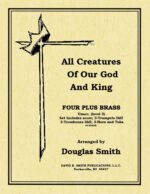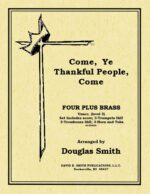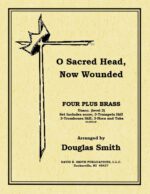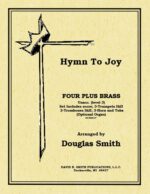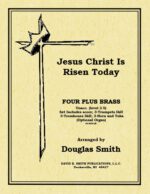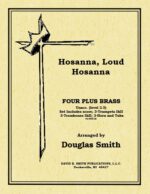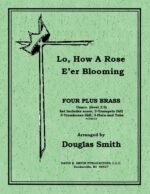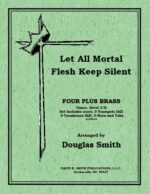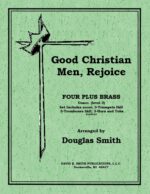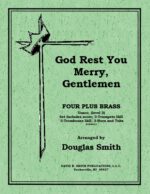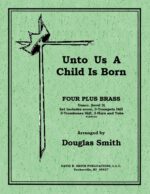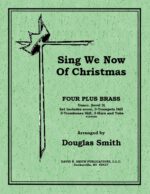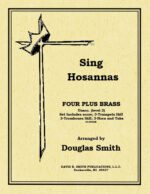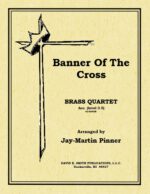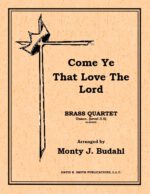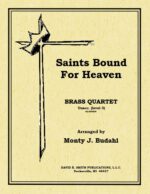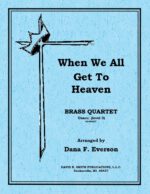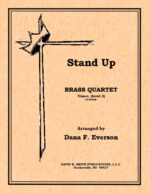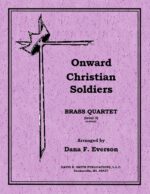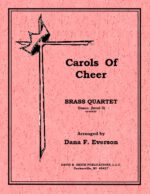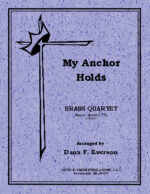-
All Creatures/Our God And King
$9.95Four Plus Brass Series- for two Trumpets and two Trombones (with opt. Horn and Tuba for color). In Alla breve the trumpets begin the piece in exultation with counter-movement in the trombones passing through a maze of meter changes. The theme tends to be insolated by part, but does exchange between the voices in an imitative format. This format continues, only in a more harmonically full scoring. The second section is stronger in fabric and the voicing becomes more solid. This all leads up to a solid conclusion with a final statement of satisfaction.
-
Count Your Many Blessings
$9.95Four Plus Brass Series- for two Trumpets and two Trombones (with opt. Horn and Tuba for color). Beginning with a tempo and style of vitality the introduction uses motivic repetitions until the trombones establish the tune with trumpet counterpoint. The rest of the whole first section is an exchange of thematic motives amongst the parts. With a modulation the trumpets present a little duet with the trombones adding brief flourishes. The final section again presents melodic motives passed around the various voices and then slows to a strong conclusion.
-
Come, Ye Thankful People, Come
$9.95Four Plus Brass Series- for two Trumpets and two Trombones (with opt. Horn and Tuba for color). With excited anticipation the piece breaks forth with imitative motives until it settles down to the first statement of the theme. It continues in a rather straight forward manner with constant interplay of the parts. It gains strength and progresses through various harmonic stages until it relaxes to a softer, slower statement of the theme in the trombones. The final section is reminiscent of the earlier theme until in relaxes into a final statement.
-
O Sacred Head, Now Wounded
$9.95Four Plus Brass Series- for two Trumpets and two Trombones (with opt. Horn and Tuba for color). Without any introduction the piece begins in four-part harmony and in a deeply reflective expression. As is the original, there are many meter changes. The second section is carried exclusively in the trombones until it is taken over by muted trumpets until consummated with harmonic divergence. The final section is established by the trumpets with subtle underpinning by the trombones. With one final strong presentation of the tune the piece concludes in repose- as one might expect.
-
Hymn To Joy (opt organ)
$9.95Four Plus Brass Series- for two Trumpets and two Trombones (with opt. Horn and Tuba for color). The introduction begins with an infectious motif which pictures a regal procession. The following section continues in the same flavor with new stately material, with a modulation the ensemble presents an intermission. Then the piece goes back to the material of the beginning. The next section becomes more harmonically diverse and builds more tension leading to a modulation where the song’s theme is presented in the trombones, then the trumpets. Coming to the Coda section an optional organ (and even congregation) gives a stately rendition of the famous “Hymn To Joy.”
-
Jesus Christ Is Risen Today
$9.95Four Plus Brass Series- for two Trumpets and two Trombones (with opt. Horn and Tuba for color). Beginning in a vigorous manner the introduction establishes jubilation leading up to the first statement of the theme in the trumpets echoed by the trombones. This exchange of motives continues throughout the whole first section until a rallentando presents the theme once again in a slower more expressive manner. This all leads up to the end where the style is broader and conclusive.
-
Hosanna, Loud Hosanna
$9.95Four Plus Brass Series- for two Trumpets and two Trombones (with opt. Horn and Tuba for color). Beginning in a robust and jubilant manner with unison statements in the voices. The trombones carry the tune with brief flourishes of punctuation in the trumpets. Then breaking into a duet in the trumpet and trombone in an imitative fabric, the piece gives over to the trumpets carrying the theme. The next section is slower and more harmonically divergent. Then once again a more vigorous manner like the beginning where the piece concludes with optional endings.
-
The Holly and The Ivy
$9.95Four Plus Brass Series- for two Trumpets and two Trombones (with opt. Horn and Tuba for color). Right out of the ate the first trumpet establishes the tune and the style in a vigorous manner. The middle voices then chase after each other in a gracious counterpoint. The middle section presents the tune in the trombone line while the trumpets offer an obbligato addition. With the second trombone presenting the tune the upper voices offer a rollicking accompaniment. The a modulation where the style becomes more florid it all becomes more solidified to a hold. Then, it takes off once again the a brisk ending.
-
Lo, How a Rose E’re Blooming
$9.95Four Plus Brass Series- for two Trumpets and two Trombones (with opt. Horn and Tuba for color). The introduction begins in a slow, plaintive manner leading to a gentle statement of the tune in four-part harmony while going through a series of meter changes. The section features the trombone in the theme until it once again comes to a point of repose. Then finalizes in a state of solemnity
-
Let All Mortal Flesh Keep Silent
$9.95Four Plus Brass Series- for two Trumpets and two Trombones (with opt. Horn and Tuba for color). In a slow alle breve the piece begins in a mysterious fashion in octave unisons. Leading into the section where the parts move in a two part counterpoint until it becomes more choral. Then it segues into a solemn mood with a trombone solo carrying the tune with answering sections in the trumpets. With a segment of strength and power and in a block chordal movement the piece continues to settle into solemnity until it concludes to a single pitch.
-
Good Christian Men, Rejoice
$9.95Four Plus Brass Series- for two Trumpets and two Trombones (with opt. Horn and Tuba for color). Presented in a jaunty and rollicking meter with the tune in the first trumpet. Later it is passed to the first trombone. The middle section of the work strays from the traditional tune for interest only to gravitate back to it. The final section mimics the first section and brings the piece to a final punctuation.
-
God Rest You Merry, Gentlemen
$9.95Four Plus Brass Series- for two Trumpets and two Trombones (with opt. Horn and Tuba for color). In alla breve, the style is pensive a thoughtful of mankind at peace with their situation The trumpets carry the tune throughout the whole first section until it goes into a imitative section with the trombones. After a modulation takes place the trombones carry the tune much in the same style as the trumpets, earlier. The final section becomes more relaxed where it lies in simple relation.
-
Unto Us A Child Is Born
$9.95Four Plus Brass Series- for two Trumpets and two Trombones (with opt. Horn and Tuba for color). The theme is built on the tune Puer Nabis and is in alle breve. The lines are long and solemn, primarily in the trumpets. The second section Is built in a light fughetta fabric giving interest until in breaks into a three meter with the motive passed back and forth between trumpets and trombones.The final section mirrors the open section until it bows in repose
-
Sing We Now of Christmas
$9.95Four Plus Brass Series- for two Trumpets and two Trombones (with opt. Horn and Tuba for color). The piece begins in a flowing manner- fir by the trumpets and the trombone. The next section has more contrapuntal structure heightening the emotion of the work. Various statements of these motives continue to a brief fermata, and then a more vigorous statement of the theme bringing the piece to a strong conclusion.
-
Sing Hosannas
$9.95Four Plus Brass Series- for two Trumpets and two Trombones (with opt. Horn and Tuba for color). The piece begins in a trumpet duet fashion and then echoed back in similar manner by the trombones. The next section is tossed about with bell like support motives, only to be broken down in motives and passed around the various voices. A modulation takes place and pieces like the beginning are once again presented and then back to the motive repeats bringing the piece to a strong conclusion.
-
-
Come Ye That Love the Lord
$7.00A brass quartet for two trumpets and two trombones with opt. parts for Fr. Horn and Baritone TC. The pieces begins with canonic entrances and then increases in activity. The first thematic statement is stately in a block harmonic structure. The parts then state the tune with others in an ornamental addition. A modulation takes place and the first tombone/horn states the theme while the others portray soft bell-tone like accompniment. A spirited entrance from low voices to higher in a fugal format coming to a final, majestic Coda marking a strong ending.
-
-
Saints Bound For Heaven
$7.00A brass quartet for two trumpets, horn, trombone/baritone (BC & TC) in cut-time. The introduction is based on thematic material in a Q&A format between the trumpet and trombone. The style is in a spritely march galop giving an never-ending sense of motion. The second section passes the motives between parts giving continued activity leading up to a transition and modulation. The third section is simple but expansive until it settles down to a sense of destination and then a quick conclusion.
-
God Of Our Fathers Fanfare
$6.00Score for two trumpets and two trombones with optional parts for French horn and Baritone TC. The piece is majestic as one might expect for a fanfare. The melodic material is pretty well in the trumpets throughout with the lower instruments given harmonic and contrapuntal support. The piece is not overly long and would serve as a stately introduction or intermission to all sorts of venues.
-
When We All Get To Heaven
$7.00Scored for two trumpets and two trombones with opt. Horn for Trom. 1 and Bar. TC for Trom. 2. The opening begins excitedly while giving a sense of moving upward. The first presentation of the theme is very much in a march style and then breaks into more activity with rhythmic alterations. The second section moves to a new key and is essentially a trombone duet and then adds upper voices to place the piece on an elevated plain. Another modulation moves the musical thought even higher while passing the melodic motifs around to the different voices. The Coda gives a sense of elevation and arrival.
-
Stand Up
$8.00A brass quintet with opt. horn and BHTC parts. After a rousing introduction the piece goes into a straight forward rendition of “Stand Up For Jesus” with the melody in trumpet one with various rhythmic devices in the other parts. After a brief transition a modulation occurs presenting “Stand Up, Stand Up For Jesus” again the melodic material is passed around amongst the parts. After another transition and modulation the piece reverts back to the first tune where it becomes more rhythmically active up to a fiery conclusion.
-
Onward Christian Soldiers
$9.00An accompanied brass quartet for two trumpets with opt. horn and BHTC with piano. The opening is a fanfare with resolve. The first rendition of the tune is passed between parts in a somewhat hocket fashion where it continues throughout. The second section is more chordal with the accompaniment more march and fanfare like. Then a brief transition in the piano only is joined by the brass in a cascading series of entrances. Then the brass join the piano in a Q/A transition leading into a choral presentation of the theme. After a motivic interplay of the brass the piece concludes in an augmented statement in the brass.
-
Carols Of Cheer
$8.00A Christmas brass quartet score for two trumpets, horn and trombone with optional parts for Flugel horn (horn) and bartione (trombone) in a medley format includes “Fum Fum Fum,” “Come Here Little Children,” ” Ding Dong Merrily On High” that bubbles with delight from beginning to end. With multiple key transitions and color shifts this medley will add delight and cheer to this festive time of the year.
-
My Anchor Holds
$8.00A brass quartet that begins with delightful counterpoint and then breaks into the tune in the trombone with a horn counterline which in turn is punctuated with the trumpet lines. The middle section opens with the horn offset by the other voices and then the melodic material is passed around among all voices. The final section becomes even more active and ends with a solid resolve. (Opt parts Trp for horn and Bar. TC for trombone.)

